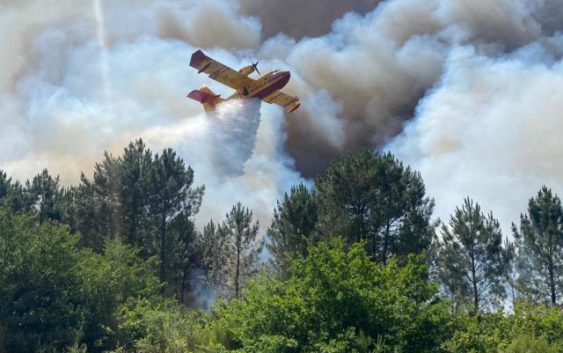- Charlotte-based marketing agency announces $20,000 Creative Campaign Grant to help communities after Hurricane Helene
- Artists transform hurricane aftermath into hoop-inspired masterpieces at Charlotte exhibit
- NC's cost for Hurricane Helene damage is nearly $60 billion, state says
- State to develop drone program to better respond to disasters like Helene, Florence
- South Carolina residents face deadline to get storm debris out to the curb after Hurricane Helene
Wildfire rages in Bordeaux; fire pilot killed in Portugal

PARIS — Strong winds and hot, dry weather frustrated French firefighters’ efforts Saturday to contain a huge wildfire that raced across pine forests in the Bordeaux region for a fifth straight day, one of several wildfires scorching Europe this week.
Among the worst fires have been in Portugal, where the pilot of a firefighting plane died Friday when his plane crashed while on an operation in the northeast. It was the first fire fatality in Portugal this year but the blazes have injured more than 160 people this week and forced hundreds to be evacuated.
Fire season has hit parts of Europe earlier than usual this year after an unusually dry, hot spring that left the soil parched and which authorities attribute to climate change.
As the worst French fire moved closer to inhabited towns, some of the 11,000 people who evacuated in the region described fear and uncertainty about what they’d find when they get back home. Images shared by firefighters showed flames shooting across a mass of pine trees and black smoke stretching across the horizon.
Firefighters focused efforts Saturday on using fire trucks to surround villages at risk and save as many homes as possible, Charles Lafourcade, overseeing the French firefighting operation, told reporters.
Some 3,000 firefighters backed by water-dumping planes are battling the blazes in southern France, the president said, and Greece sent firefighting equipment to help.
French firefighters managed to contain one of the worst fires overnight, near the Atlantic coast resort of Arcachon that is popular with tourists, the regional emergency service said Saturday. But it said “tough meteorological conditions” thwarted efforts to contain the biggest fire in the region, which started in the town of Landiras, south of a valley of Bordeaux vineyards. Regional prosecutors suspect arson.
The two fires have burned at least 9,650 hectares (23,800 acres) in recent days.
In Portugal, more than 1,000 firefighters worked Saturday alongside ordinary citizens desperate to save their homes after a long week of battling multiple blazes around the country. The fires have been fanned by earlier-than-usual extreme temperatures and drought conditions.
Portuguese state television RTP reported Friday that the area burned this year — more than 30,000 hectares (74,000 acres) — has already exceeded the total for 2021. Most of it burned in the past week.
Across the border, Spain was struggling to contain several fires, including two that have burned about 7,400 hectares (18,200 acres).
In southern Andalusia, 3,000 people were evacuated from villages in danger from a blaze that started near the village of Mijas in the province of Malaga. Around 200 firefighters supported by 18 aircraft tried to contain the fire. Authorities were investigating its cause.
For a sixth day, firefighters were also trying to bring under control a fire started by a lightning strike in the west-central Las Hurdes area. Some 400 people from eight villages were evacuated Friday as the flames approached their houses and threatened to spread into the nearby Monfrague National Park.
Croatia and Hungary have also fought wildfires this week, as have California and Morocco.
Many European countries are facing exceptional heat this month also attributed to climate change.
Temperature-related deaths have surged in Spain this week amid a heat wave that has kept highs above 40 degrees Celsius (104 degrees Fahrenheit) in many areas. According to Spain’s Carlos III Institute, which records temperature-related fatalities daily, 237 deaths were attributed to high temperatures from July 10-14. That was compared to 25 temperature-related deaths the previous week.
Portuguese authorities said a July national record high of 47 C (117 F) hit the northern town of Pinhao on Wednesday.
Britain’s Met Office weather agency has issued its first-ever “red warning” of extreme heat for Monday and Tuesday, when temperatures in southern England may reach 40 C (104 F) for the first time.
The British government was holding an emergency response meeting Saturday to plan for the high temperatures. People in the U.K. have already been warned not to travel unless absolutely necessary and schools and nursing homes have been told to take extra precautions.
“All heat waves studied so far in Europe are getting warmer,” said Robert Vautard of the Pierre-Simon Laplace Institute at the Sorbonne University. “As long as greenhouse gas emissions are not reduced to zero, heatwaves will continue to intensify, become more frequent and last longer.”
In Turkey — the scene of devastating wildfires last summer — local media reported fires in the western province of Izmir and in Hatay between the Mediterranean Sea and the Syrian border. Helicopters, planes and hundreds of firefighters tackled the blazes.
Fires fed by strong winds and scorching temperatures last year tore through Turkey’s Mediterranean and Aegean regions, killing at least eight people and leading to fierce criticism of the government for its inadequate preparation and response.
___
Wilson reported from Barcelona, Spain. Danica Kirka in London and Andrew Wilks in Istanbul contributed.
___
Follow all AP stories on climate change issues at https://apnews.com/hub/climate.